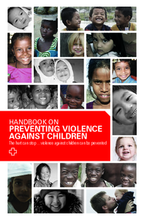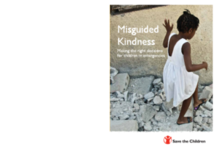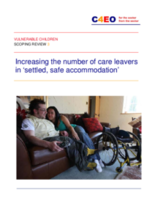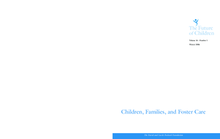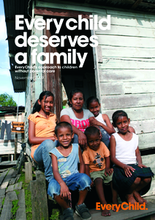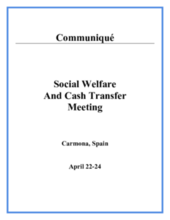This page contains documents and other resources related to children's care in the Americas. Browse resources by region, country, or category.
Displaying 3071 - 3080 of 3191
Ce rapport examine les pratiques de l'adoption internationale suite au tremblement de terre en Haïti. Haïti a été un pays d'origine «populaire», en ce sens que des milliers d'enfants se trouvaient à un certain stade du processus d'adoption- parfois simplement "identifiés" comme potentiellement adoptables - au moment du séisme. Les réponses des «pays d'accueil » et autres relatives à l'adoption ultérieure des enfants déplacés à l'étranger furent diverses et contrastées.
The Canadian Red Cross has produced a handbook on the prevention of violence against children. The handbook includes specific guidance on preventing violence against vulnerable children, such as children in institutions, children involved in armed conflict and children with disabilities.
Using lessons learnt in emergencies, from the genocide in Rwanda to the Asian Tsunami and the earthquake in Haiti, our new report, Misguided Kindness, demonstrates what action is needed to keep families together during crises and to bring separated children back into a safe and nurturing family life.
This scoping study assesses the nature and extent of the evidence base in relation to increasing the number of care leavers in ‘settled, safe accommodation’. The Social Care Institute for Excellence (SCIE) carried out the study on behalf of the Centre for Excellence and Outcomes in Children and Young People’s Services (C4EO), between November 2008 and February 2009.
Provides global estimates of the number of highly vulnerable children; a summary of United States Government (USG) assistance programs for highly vulnerable children; a summary of progress coordinating the response among USG agencies; key strategic issues and opportunities; priorities for 2009–2010 and beyond; and a summary of the results and achievements of USG assistance
This document outlines EveryChild’s approach to the growing problem of children without parental care by defining key concepts, analysing the nature and extent of the problem, exploring factors which place children at risk of losing parental care, and examining the impact of a loss of parental care on children’s rights.
This paper examines the efficacy of Independent Living (IL) services in the United States in preparing foster youth to live “independently”, and calls into question the appropriateness of an “independence” goal for youth aging out of foster care.
Experts gathered in Carmona Spain to examine the results of policy relevant systemic reviews on social welfare and cash transfers. Meeting delegates explored the findings of reviews on integration of social welfare services and cash transfers in Ghana, Chile, Zimbabwe, Malawi and Kenya.
The current assessment is the fourth in a series of independent assessments examining core systemic issues in Michigan’s child protection system.


